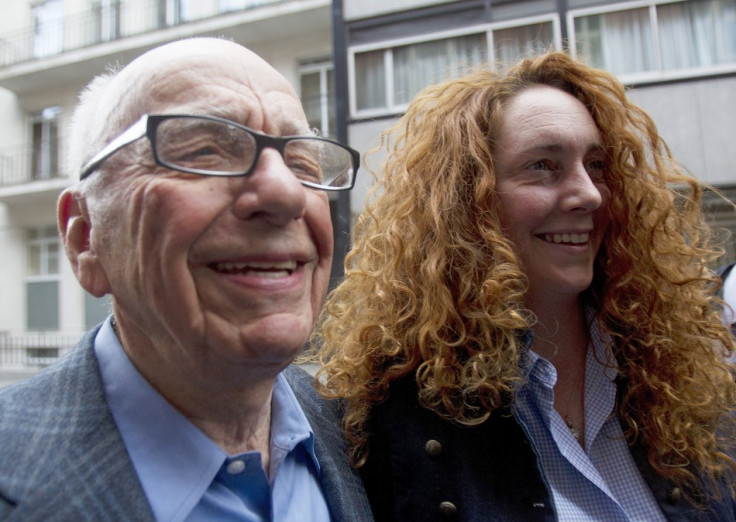Phone hacking: Britain's ever downward circulation figures and the suicide of a salacious tabloid

Newspaper sales in Britain are on a downward slope and have been for many years. Now, after this Sunday past, 10 July 2011, the figures will, most likely, fall off a cliff. On Sunday, the country's biggest selling weekend newspaper, the News of the World, issued its last edition. The paper's front page headline, for anyone not in the know, appeared celebratory, announcing: "THANK YOU & GOODBYE" and adding underneath: "After 168 years, we finally say a sad but very proud farewell to our 7.5m loyal readers"
Well, at least that avoided the awkward reasons on its front page for its lightning departure. Its demise has been so swift that nobody is quite sure at present what, if anything, is going to fill the void! No, not The Independent on Sunday - but good try, I like it too - and wishful thinking!
One must not be fooled by that 7.5 million readers figure for the News of the World, which is, of necessity, only a rough guess and was easily exceeded by this last issue because many, like myself, purchased a copy as a "souvenir" on sales just announced, exceeding four million copies. The fact of the matter is, that not one of Britain's major daily newspapers has recorded a sales increase over the past year and only one Sunday paper, the Mail on Sunday, a tiny 0.01 per cent rise.
On 10 June 2011, the PressGazette published National Newspaper Print Circulations for May 2011 (source ABC). Taking first the Sundays, News of the World was way out in front by a mile, with 2.657 million; followed by the Mail on Sunday: 1.919 million (not to be confused with the Sunday Mail: 362,000); the Sunday Mirror: 1.087 million; and the Sunday Times: 1.050 million. All figures, average sales per issue.
A concern for all these newspapers is the loss in Sales figures since May 2010, though the PressGazette does issue a caveat that some titles, 2010 figures, may have been boosted by the May 2010 General Election coverage.
If the News of the World had the biggest sales total, it also recorded the biggest year-on-year loss, at 7.1 per cent, of its 'million plus' selling rivals. Its 'quality paper' News International stable mate, the Sunday Times, lost 6.1 per cent during the same period.
Switching to the Dailies, News International's, The Sun, is still well clear in the battle for readership with 2.847 million sales per day of issue for May 2011, a three per cent fall year-on-year. Much more worrying is the figure for its 'quality' partner, The Times, which recorded a drop of 13.3 per cent year-on-year to under 447,000 copies sold per day of issue.
A possible small note of cheer for News International/Corporation might be that their probable least favourite paper, The Guardian, the paper which has constantly articled the phone-hacking story, only managed an average sales per issue of 262,937 representing a rather harsh 12.5 per cent fall between May 2010 and May 2011.
Returning to the prodigal, just a little over half way through Page 3 of my special News of the World issue, the paper finally acknowledges the cause of its demise and the pickle its parent company finds itself facing:
"...as we are now only too painfully aware, for a period of a few years up to 2006, some who worked for us, or in our name, fell shamefully short of those (high) standards.
"Quite simply, we lost our way.
"Phones were hacked, and for that this newspaper is truly sorry.
"There is no justification for this appalling wrongdoing.
"No justification for the pain caused to victims, nor for the deep stain it has left on a great history...."
Most of the bile, for the moment at least, centres around the News of the World and quite possibly Messrs Rupert and James Murdoch have done the right thing by excising a cancerous limb. Once the big advertisers either withdrew or suspended their accounts with the News of the World, the paper's survival was only a matter of time.
Maybe the Board thought that its saucy, risk taking format had had its day. Assuredly, the paper lost its way, as admitted, but the revelation on 04 July 2011 of the hacking of child-murder victim Milly Dowler's phone indicated just how very lost, and was the final straw that outraged a fairly cynical public and the News of the World's big advertisers. Few can doubt that if the paper's private investigator had simply hacked the phones of celebrities, even the odd politician, an apology and statement that such practices had ceased would have been sufficient.
Further allegations of phone hacking very quickly followed. On 08 July 2011, Prime Minister David Cameron announced a judge-led enquiry into the phone-hacking scandal and into allegations that some will consider even more serious, of members of the Police accepting payment in exchange for information.
The danger here is the risk of throwing baby out with bath water and killing investigative journalism. This, I think more than anything else, made the Government appear reluctant to act. How did the Daily Telegraph happen upon all these MPs' expense claims? Killing off investigative journalism will be very bad for sales figures and, further, is bad for democracy for who is to be the judge of what is, or is not, a good cause and the methods needed to get to the truth?
Oh well, who needs to read anyway? There's always the telly!
© Copyright IBTimes 2025. All rights reserved.





















